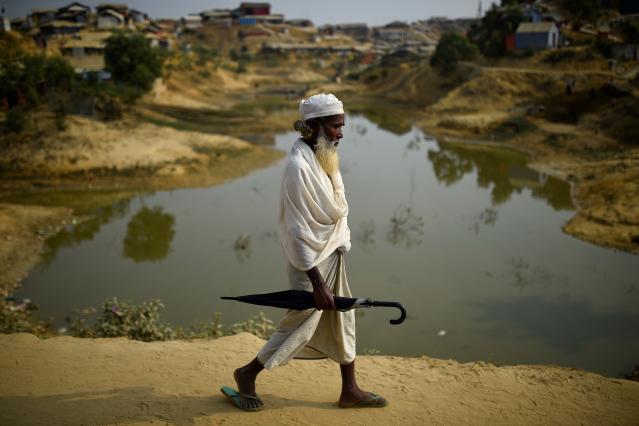At a meeting in Copenhagen on June 8, Myanmar’s Social Welfare Minister Win Myat Aye told a group of diplomats, analysts and members of a commission chaired by former United Nations Secretary-General Kofi Annan that eight of its recommendations - including one that asks authorities to take steps to amend the 1982 law - were problematic in the current political climate and could not be immediately fulfilled, the people present said.
“He made it very clear that citizenship reform was a non-starter,” said one of the people at the meeting. The sources spoke on condition of anonymity because Myanmar had requested the talks be confidential.
Win Myat Aye and government spokesman Zaw Htay did not answer calls seeking comment.
Amending the law, which largely restricts citizenship to members of what it terms “national races” - the 135 ethnic groups deemed by the state to be indigenous - was a key recommendation of the Annan commission.
Buddhist-majority Myanmar does not recognize the Rohingya as an indigenous ethnic group and refers to them as “Bengalis”, a term they reject as it implies they are interlopers from Bangladesh, despite a long history in the country.
The Annan commission was created by Myanmar leader Aung San Suu Kyi in 2016 to find long-term solutions to deep-seated ethnic and religious divisions in Rakhine. A day after the panel issued its report in August 2017, Rohingya insurgents launched attacks on security forces, provoking a military crackdown the UN has called a “textbook example of ethnic cleansing”.
The admission by Win Myat Aye, who is overseeing plans for reconstruction in violence-ravaged Rakhine state, casts further doubt on plans to repatriate the roughly 700,000 Rohingya currently sheltering in crowded refugee camps in Bangladesh.
Many Rohingya refugee leaders say they won’t return without guarantees of citizenship.
However, Myanmar’s National Security Adviser Thaung Tun, who was also at the meeting in Denmark, told Reuters authorities were implementing the Annan commission’s recommendations “to the fullest extent possible and as expeditiously as we can”.
“Over 80 recommendations have been carried out in less than 10 months,” he said in an email.
Referring to the recommendations that had not been implemented, he said they were “also being looked into”.
Annan’s spokesman referred questions to the Myanmar government.
Refugees have reported killings, burnings, looting and rape by members of the Myanmar security forces and Buddhist vigilantes in Rakhine. Myanmar has rejected accusations of ethnic cleansing, and dismissed most accounts of atrocities.
“PATH TO CITIZENSHIP”
In January, Myanmar and Bangladesh signed a deal to repatriate the refugees within two years, but disagreements have held up the implementation of the plan.
Many Rohingya refugees say they will not return unless the 1982 law is changed.
People who identified themselves as Rohingya were excluded from Myanmar’s last nationwide census in 2014 and many had their identity documents taken or nullified, blocking them from voting in a landmark 2015 election.
Suu Kyi, who before coming to power said the government should have the “courage” to review the law, is now urging Rohingya to accept the National Verification Card, a residency document that falls short of full citizenship.
However, many Rohingya refuse to accept the document, which they say classifies life-long residents as new immigrants and does not allow them to travel freely.
The military, with whom Suu Kyi shares power, flatly rejects Rohingya calls for citizenship. In a speech in March, Senior General Min Aung Hlaing said Rohingya “do not have any characteristics or culture in common with the ethnicities of Myanmar” and that the current conflict had been “fuelled because the Bengalis demanded citizenship”.
DIPLOMATIC DIFFICULTIES
At the Copenhagen meeting, diplomats were about to break for lunch when Win Myat Aye said Myanmar had begun implementing only 80 of the 88 recommendations made by the commission, due to political and practical differences with the remaining eight, one of those present said.
According to a second person present, Annan responded: “You said you’re having difficulties with eight – which are those? Let’s get back to this after the break.”
Win Myat Aye then listed the recommendations he said Myanmar was struggling to implement. They included commitments to create an independent body to review complaints about citizenship verification, empower community leaders and civil society, and establish a mechanism for feedback on government performance.
“In diplo-speak when you say that something is difficult it tends to be a rejection,” the second source said. “That is how I understood this.”
More about: #Myanmar
















































